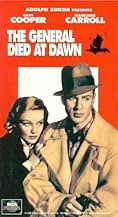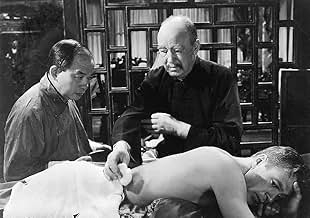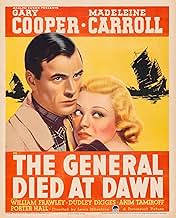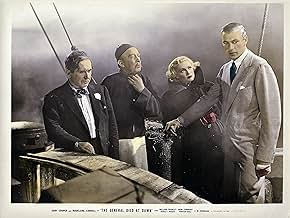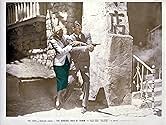AVALIAÇÃO DA IMDb
6,4/10
1,4 mil
SUA AVALIAÇÃO
Adicionar um enredo no seu idiomaAmid the anarchy of China, an American mercenary tangles with a ruthless warlord.Amid the anarchy of China, an American mercenary tangles with a ruthless warlord.Amid the anarchy of China, an American mercenary tangles with a ruthless warlord.
- Direção
- Roteiristas
- Artistas
- Indicado a 3 Oscars
- 1 vitória e 3 indicações no total
Lee Tong Foo
- Mr. Chen
- (as Lee Tung-Foo)
Hans Fuerberg
- Yang's Military Advisor
- (as Hans Furberg)
Irene Bennett
- Passenger
- (não creditado)
Spencer Chan
- Killer
- (não creditado)
Thomas Chan
- Houseboy
- (não creditado)
- Direção
- Roteiristas
- Elenco e equipe completos
- Produção, bilheteria e muito mais no IMDbPro
Avaliações em destaque
"The General Died at Dawn" features Gary Cooper in a role similar to the one he played in "For Whom the Bell Tolls" a couple of years later. Directed by Lewis Milestone the movie is visually stunning and exciting. Madeleine Carroll (fresh from her success in Hitchcock's "The 39 Steps")is very good as Cooper's love interest.Akim Tamiroff was nominated for an Oscar as the General.He's certainly a menacing figure here.But I think Philip Ahn as his second in command delivers the best performance.What subtle fanaticism he conveys.The movie is full of interesting twists in the storyline and except for the ending,which I found a bit silly,it is a solid movie.
I was surprised at the low rating for this film at IMDb, 6.7 as of this writing. I found it a very enjoyable film. I'm a sucker for strong, moody visuals, and this film sure has them. In fact, about half way through I began to wonder, with all the shadows and fishing nets, if this were a Von Sternberg film. The script, which some reviewers found too wordy or too preachy, I found very engaging. The pacing was excellent.
Some reviewers have taken offense at the two main Chinese characters being played by occidentals who spoke pigeon English. Well, that's how films were made back then. Sure it seems unfair to modern viewers. It was unfair. Is that reason to trash the whole film? The Asian actors who had speaking roles came across as intelligent and well spoken.
If you're in the mood for some dark, exotic espionage, I definitely recommend this.
Some reviewers have taken offense at the two main Chinese characters being played by occidentals who spoke pigeon English. Well, that's how films were made back then. Sure it seems unfair to modern viewers. It was unfair. Is that reason to trash the whole film? The Asian actors who had speaking roles came across as intelligent and well spoken.
If you're in the mood for some dark, exotic espionage, I definitely recommend this.
The scene in the train where femme fatal Judy Perrie seduces O'Hara is a masterpiece of steamy sensuality. Carroll's silky-smooth alabaster skin and flaxen hair, gorgeously highlighted by her exquisitely outlined lips and eyes, were masterfully exploited by director Lewis Milestone and some extremely skilled cameramen, as her feminine delights proved too much for the otherwise unswervingly steadfast O'Hara. Throughout, the curiously uneven script takes a decided turn for the better, with both participants delivering some highly suggestive verbal exchanges, brimming with innuendo and wit, culminating with O'Hara mockingly asking Judie if he can kiss her, only to receive in return the playful reply that he must first ask her mother. He then looks into the neighboring compartment and makes the request in mock earnestness, for there is no Mrs. Perrie! All the while, the sinister war lord General Yang and his dark forces are preparing to intercept the train, "relieve" O'Hara of the funds he's set to deliver to Mr. Wu for the sole purpose of ridding the province of the scurrilous Yang. Let your imaginations soar, esteemed classic film buffs, for this is truly great film-making.
Lewis Milestone is surely one of the most under-appreciated directors from Hollywood's Golden Era. He may be the best example to illustrate how cinematographers and film editors have less to do with how good a movie looks than the director himself. Lewis Milestone's pictures exhibit the same fluid, sensuous, exhilarating black and white cinematography and silky smooth scene changes no matter who his camera man and editor were. The fluid movement of his camera was his trade mark and an innovative style much copied, especially in the 'forties. He is in fact credited with the invention of the camera dolly while filming the early talkie classic All Quiet On The Western Front (1930).
In The General Died At Dawn the gorgeous cinematography finds a worthy subject of concentration in the breath-taking beauty of leading lady Madeleine Carroll, who plays a tormented femme fa-tale, manipulated into wicked and even murderous money-making schemes by her terminally ill and morally challenged father (Porter Hall). When she has to lure idealistic soldier of fortune Gary Cooper into the clutches of cruel, tyrannical Chinese warlord Akim Tamiroff, she quite naturally falls in love with him -- Cooper, not Tamiroff, of course! Miss Carol has never looked lovelier than in this picture. As she reached thirty years of age, a dawning maturity was adding character to her beauty and endowing her gorgeous face with an aching sensuality. Okay, trying to describe what makes a beautiful woman that way is like trying to describe what makes Oreo cookies taste so good. Believe me, Madeleine had it! Not to mention, she was a terrific actress!
When Gary Cooper is on screen, he doesn't have to worry about anyone stealing attention, even a beaut like Madeline Carroll. Tamiroff, who earned an Accademy Award nomination for his role, is bizarrely riveting, as he was in nearly every movie appearance. Good support is also provided by Hall in one of his best performances, Dudley Digges, and William Frawley. Frawley is rather irritating, as in all his roles, but it was intended here.
The plot is confusing at times, and doesn't always make complete sense, but it wasn't so difficult to keep up with as others have carried on. Compared to, say, The Big Sleep (1946), it was as easy to follow as The Three Little Pigs. Whatever the story, Milestone knew how to reel it out in a way that would keep your peepers glued to the screen. This style of suspenseful story-telling immersed in eye-grabbing cinematography would be honed to a fine edge in the next decade with his masterpieces Edge Of Darkness (1943) (see my review) and The Strange Loves of Martha Ivers (1946). In fact this 1936 movie's flowing camera work, oblique angles, frequent night scenes, and dark, brutal story seem to be pointing the way to the stylish noir thrillers of the next decade.
The General Died At Dawn has everything you could ask from a movie -- top stars, exciting action, gorgeous cinematography. Top-notch Old Hollywood entertainment from the smoothest of the smooth, Lewis Milestone!
In The General Died At Dawn the gorgeous cinematography finds a worthy subject of concentration in the breath-taking beauty of leading lady Madeleine Carroll, who plays a tormented femme fa-tale, manipulated into wicked and even murderous money-making schemes by her terminally ill and morally challenged father (Porter Hall). When she has to lure idealistic soldier of fortune Gary Cooper into the clutches of cruel, tyrannical Chinese warlord Akim Tamiroff, she quite naturally falls in love with him -- Cooper, not Tamiroff, of course! Miss Carol has never looked lovelier than in this picture. As she reached thirty years of age, a dawning maturity was adding character to her beauty and endowing her gorgeous face with an aching sensuality. Okay, trying to describe what makes a beautiful woman that way is like trying to describe what makes Oreo cookies taste so good. Believe me, Madeleine had it! Not to mention, she was a terrific actress!
When Gary Cooper is on screen, he doesn't have to worry about anyone stealing attention, even a beaut like Madeline Carroll. Tamiroff, who earned an Accademy Award nomination for his role, is bizarrely riveting, as he was in nearly every movie appearance. Good support is also provided by Hall in one of his best performances, Dudley Digges, and William Frawley. Frawley is rather irritating, as in all his roles, but it was intended here.
The plot is confusing at times, and doesn't always make complete sense, but it wasn't so difficult to keep up with as others have carried on. Compared to, say, The Big Sleep (1946), it was as easy to follow as The Three Little Pigs. Whatever the story, Milestone knew how to reel it out in a way that would keep your peepers glued to the screen. This style of suspenseful story-telling immersed in eye-grabbing cinematography would be honed to a fine edge in the next decade with his masterpieces Edge Of Darkness (1943) (see my review) and The Strange Loves of Martha Ivers (1946). In fact this 1936 movie's flowing camera work, oblique angles, frequent night scenes, and dark, brutal story seem to be pointing the way to the stylish noir thrillers of the next decade.
The General Died At Dawn has everything you could ask from a movie -- top stars, exciting action, gorgeous cinematography. Top-notch Old Hollywood entertainment from the smoothest of the smooth, Lewis Milestone!
O'Hara (Gary Cooper) is on a mission to deliver money to Mr Wu (Dudley Digges) so that Mr Wu can buy weapons from Brighton (William Frawley) in his struggle against the Chinese warlord General Yang (Akim Tamiroff). However, he is betrayed by Judy Perrie (Madeleine Carroll) and her father Peter Perrie (Porter Hall) and is captured by Yang on a train. He hands over the money and is taken hostage but escapes and determines to get the money back.......
This film is pretty confusing and you have to pay attention to keep up. It still loses you in parts, though, especially at the beginning. The cast are nothing special and fall in between the extremes of Akim Tamiroff who is excellent as the warlord and William Frawley who is dreadful in every scene that he appears in. Frawley also has an awful, raspy-throat voice which really invades your brain. He manages to produce a very offensive performance and it doesn't help the film at all.
The story confuses at the beginning, then levels out into semi-tedium with unbelievability factor 10. The way in which Cooper breezes through the film with his cocky manner is pure phoniness (he would have been killed at his first meeting with Yang). The plot is also somewhat cheapened by the way that General Yang meets his death. Frawley's involvement in the final denouement is an outrageous con to those who are looking forward to a good climax.
The film is done in such a way as to preach to the viewer and this stand of taking the moral high ground insults the audience...........Shut up, Cooper!!..... There is also some really crass dialogue in the love scenes. Overall, the film is a let-down.
This film is pretty confusing and you have to pay attention to keep up. It still loses you in parts, though, especially at the beginning. The cast are nothing special and fall in between the extremes of Akim Tamiroff who is excellent as the warlord and William Frawley who is dreadful in every scene that he appears in. Frawley also has an awful, raspy-throat voice which really invades your brain. He manages to produce a very offensive performance and it doesn't help the film at all.
The story confuses at the beginning, then levels out into semi-tedium with unbelievability factor 10. The way in which Cooper breezes through the film with his cocky manner is pure phoniness (he would have been killed at his first meeting with Yang). The plot is also somewhat cheapened by the way that General Yang meets his death. Frawley's involvement in the final denouement is an outrageous con to those who are looking forward to a good climax.
The film is done in such a way as to preach to the viewer and this stand of taking the moral high ground insults the audience...........Shut up, Cooper!!..... There is also some really crass dialogue in the love scenes. Overall, the film is a let-down.
Você sabia?
- CuriosidadesThe main character, O'Hara, is based on the real-life adventurer Morris "Two-Gun" Cohen (1887-1970). Born in Poland to a Jewish family, Cohen grew up in the tough streets of London's East End. As a teenager, he moved to western Canada and became a ranch hand and gambler in Saskatchewan, and later a highly successful real-estate agent in Alberta. During World War I he fought in Europe with the Canadian Railway Troops. His friendship with Chinese workers on the Canadian-Pacific Railroad prompted him to go to China in the 1920s. After negotiating a railroad deal with Dr. Yat-sen Sun, Cohen became a personal bodyguard to Sun and a trainer of Sun's private army. After Sun's death in 1925, Cohen ran guns for various Chinese warlords throughout the 1930s. When the Japanese invaded China in 1937, Cohen continued to supply Chinese resistance forces with arms and served with the British SOE. In 1941, following the fall of Hong Kong, he was captured by the Japanese and put in a prison camp, but was traded to the English in 1943 in a rare prisoner exchange. After the war, Cohen continued to operate in China as an agent for various British firms, including Rolls-Royce and Decca Radar. His former dealings with Chinese warlords kept him in good standing with Chinese Communist officials until his death in 1970.
- Erros de gravaçãoWhile arguing with Peter, Judy slams a book down on the desk. A couple of other books on the corner of the desk disappear in a later scene.
- Cenas durante ou pós-créditosThe opening credits all appear on the sails of boats.
- ConexõesFeatured in A Hollywood Vermelha (1996)
Principais escolhas
Faça login para avaliar e ver a lista de recomendações personalizadas
- How long is The General Died at Dawn?Fornecido pela Alexa
Detalhes
- Data de lançamento
- País de origem
- Idioma
- Também conhecido como
- The General Died at Dawn
- Locações de filme
- Empresa de produção
- Consulte mais créditos da empresa na IMDbPro
- Tempo de duração1 hora 38 minutos
- Cor
- Proporção
- 1.37 : 1
Contribua para esta página
Sugerir uma alteração ou adicionar conteúdo ausente

Principal brecha
By what name was O General Morreu ao Amanhecer (1936) officially released in India in English?
Responda
